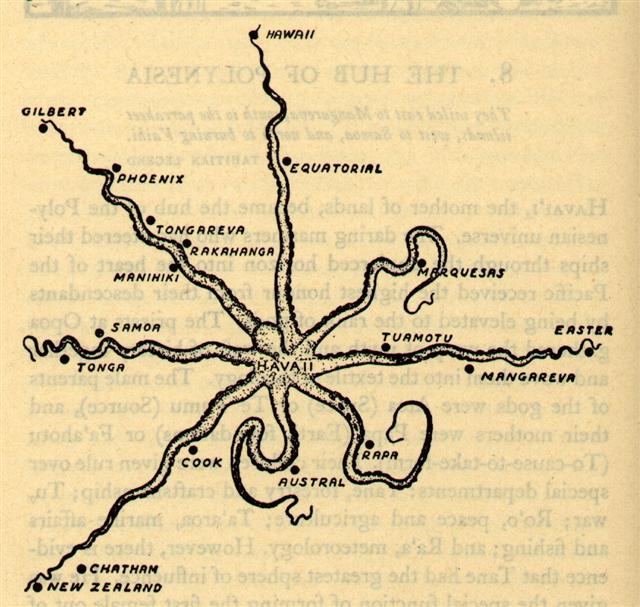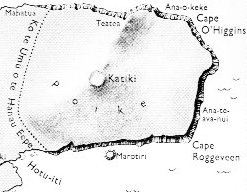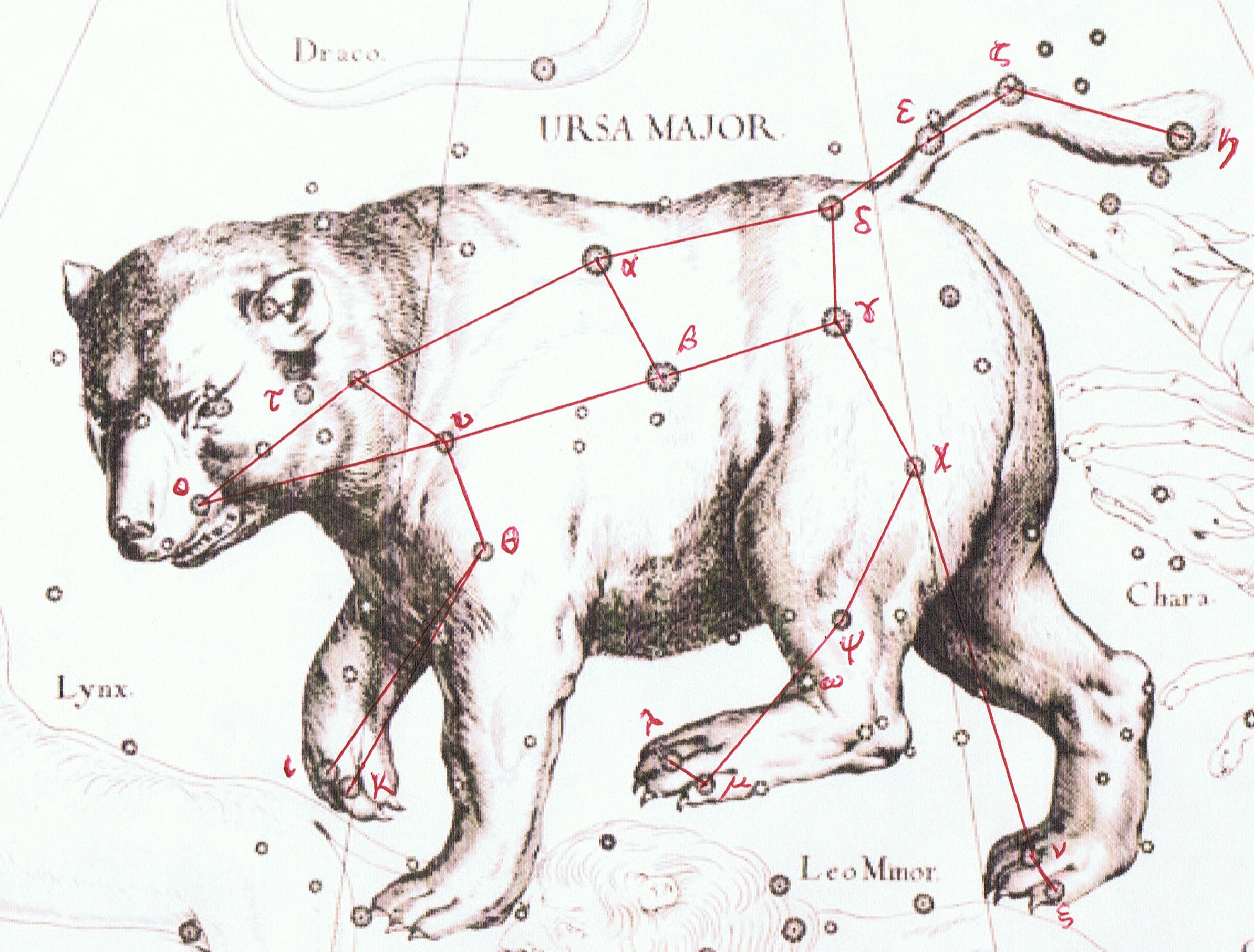Evidently there could be 5 days
for 'lighting the fire' (ka te ahi),
because this the dates will tell us (also in the
manzil calendar where beyond Ca6-21 a new
manzil is beginning)::
| 1 |
An Nathra 9 (101) |
10 |
11 |
12 |
13 |
| August 25 (237) |
26 |
27 |
28 |
29 |
 |
 |
 |
 |
 |
| Ca6-17 (157) |
Ca6-18 |
Ca6-19 |
Ca6-20 |
Ca6-21 |
| tagata oho rima - ki te marama |
koia kua oho |
ki te marama |
kua moe |
kua ka te ahi i te rima aueue - te ika |
| μ Hydrae (157.1) |
no star listed |
Shir (158.9) |
φ Hydrae (160.3) |
no star listed |
| February 24 (420) |
25 (56) |
26 |
27 |
28 (59) |
| Alterf 1 |
2 |
3 (108) |
| August 30 (242) |
31 |
September 1 |
 |
 |
 |
| Ca6-22 |
Ca6-23 |
Ca6-24 (164) |
| te marama kua hua |
marama kua tuu i te kihikihi |
| March 1 (60) |
2 |
3 |
At Ca6-22 Metoro said te marama kua hua (which I guess possibly means Moon - or 'light' - has returned, 'reincarnated'). There is rejuvenation (a new juvenile), a return (hua) of the same (hua):
| Hua 1. Testicle. 2. Figuratively: son, hua tahi, only son; fruits of the earth; to grow well (of fruits). 3. To cause a fight, a quarrel. Hua-ai, generation, as lineage of direct descendents;
contemporaries. Huahua, coccyx of bird, 'parson's nose': huahua moa, huahua uha. Huataru, a creeper (Chenopodium ambiguum). Vanaga.
1. The same; ki hua, again, to continue, to strain, to struggle, to move, to repeat, over and above. Mq.: hua, the same, to return, to recommence. 2. To bloom, to sprout; flower, fruit (huaa); huaa tae oko, huaa vahio, young fruit; hua atahi, only son; huahaga, fruit; mei te huahaga o tokoe kopu, the fruit of thy body; tikea huahaga, deceptive appearance. P Pau.: ua, to be born; huahaga, lineage. Mgv.: hua, to produce (said of trees, grain, etc.), blooming time of flowers, abundance of fruit. Mq.: hua, to produce, to bear fruit. Ta.: ua, to sprout. Huahua. 1. Tailless fowl. 2. Vein, tendon, line. 3. Mgv.: huahua, pimples covering the face. Ta.: huahua, id. Mq.: hua, tubercules. Sa.: fuafua, abscess on hand or feet. Ma.: huahua, small pimples. Pau.: Hua-gakau, rupture. Ta.: áau, entrails. Sa.: ga'au, id. Ma.: ngakau, id. Churchill.
1. Fruit. 2. Egg. 3. Tā hua = 'genealogical writing' or 'same writing'. Fischer. |
I have redmarked the meanings connected with Mangarevan hua, not only because Mangareva is a neighbouring island

but also because Pua Katiki is a kuhane station beyond Hanga Takaure:
... The dream soul went on and came to One Tea. She named the place 'One Tea A Hau Maka O Hiva'. She went on and reached Hanga Takaure. She named the place 'Hanga Takaure A Hau Maka O Hiva'. The dream soul moved upward and came to (the elevation) of Poike. She named the place 'Poike A Hau Maka O Hiva'. The dream soul continued to ascend and came to the top of the mountain, to Pua Katiki. She named the place 'Pua Katiki A Hau Maka O Hiva' ...

| Pua Pua. 1. A zingiberacea (plant of which few specimens are left on the island). 2. Flower: pua ti, ti flower, pua taro, taro flower, pua maúku pasture flower; pua nakonako, a plant which grows on steep slopes and produce red, edible berries. 3. Pua tariga (or perhaps pu'a tariga), anciently, hoops put in earlobes. 4. The nanue fish when young and tender. Puapua, summit, top, upper part; te puapua o te maúga, the top of the mountain; te puapua kupega, the upper part of a fishing net. Vanaga.
Pu'a. 1. (Modern form of pu'o), to cover up something or oneself, to put on; ka-pu'a te ha'u, put on your hat; ka-pu'a-mai te nua, cover me up with a blanket. 2. To respond to the song of the first group of singers; to sing the antistrophe; he-pu'a te tai. 3. To help; ka-pu'a toou rima ki a Timo ite aga, help Timothy with the work. 4. Pu'a-hare, to help a relative in war or in any need; ka-oho, ka-pu'a-hare korua, ko ga kope, go, give your relative a hand, lads. 5. To speak out in someone's favour; e pu'a-mai toou re'o kia au, speak in my favour, intercede for me. Pu'apu'a, to hit, to beat. Vanaga.
1. Flower, ginger, soap; pua mouku, grass. 2. To grease, to coat with tar, to pitch; pua ei meamea, to make yellow. Puapua, a piece of cloth. Mgv.: pua, a flower, turmeric, starchy matter of the turmeric and hence soap. Mq.: pua, a flower, soap. Ta.: pua, id. Ma.: puapua, cloth wrapped about the arm. Churchill. |
I imagine the kuhane stations here are pairs (One Tea / Hanga Takaure) followed by (Poike / Pua Katiki), and in the pattern Y (female) / X (male) followed by X (Poike) / Y (Pua Katiki) - i.e. in a chiastic structure. There could be a reversal between Hanga Takaure and Poike - taking place beyond manzil day 100:
|








